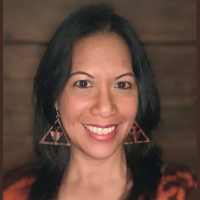
Dr. Candace K. Galla
Associate Professor
Dance/song/chant/oral traditions
Decolonizing methodologies
Decolonizing pedagogies and knowledges
Indigenous epistemologies
Indigenous Language Revitalization and Reclamation
Indigenous Language/Literacy/Digital Technology
Indigenous Literacy and Education
Language Planning and Policy
Biography
Aloha kāua! He Kanaka Hawaiʻi au. ʻO Hawaiʻi kuʻu one hānau. Raised in a sugar plantation town, Pāhala in Kaʻū, I was exposed to a diversity of languages and cultures from a young age – some of which had influence on Hawaiian Creole English (also referred to as Hawaiian Pidgin). Although ʻŌlelo Hawaiʻi (Hawaiian) was not spoken in my home, I engaged in Hawaiian cultural practices – specifically hula. Through hula I began to learn ʻŌlelo Hawaiʻi, which is the foundation of hula and without it cannot exist. I continued to learn Hawaiian language and culture formally at Kamehameha Schools Kapālama. Upon graduation, I attended the University of Arizona on the original homelands of the Tohono O’odham and Pascua Yaqui nations where I received a B.A. in Linguistics, an M.A. in Native American Linguistics and a Ph.D. in Language, Reading and Culture. While I resided in Tucson, I was the Program Coordinator of the American Indian Language Development Institute (AILDI) – the program that reignited my passion back into language renewal and inspired my research on Indigenous language revitalization and technology. I returned to Hawaiʻi and taught in Ka Haka ʻUla O Keʻelikōlani College of Hawaiian Language at the University of Hawaiʻi Hilo where I taught linguistics and Indigenous language education courses. As an Associate Professor in the department of Language and Literacy Education (Faculty of Education) and the First Nations and Endangered Languages Program in the Institute for Critical Indigenous Studies (Faculty of Arts) at the University of British Columbia, I am grateful for the opportunity to learn and teach on the traditional, ancestral, and unceded territory of the hən̓q̓əmin̓əm̓ speaking Musqueam people.
Research & Scholarship
My research and scholarship have focused on 1) Hawaiian language and Indigenous languages, emphasizing education, and community-centered revitalization, digital technology, well-being, traditional and cultural practices, and policy and planning, and 2) decolonizing and Indigenizing the academy to create pathways for Indigenous thinkers and scholars, and scholarship. My work has been disseminated through publications, TedX, keynotes, invited presentations, master classes, guest lectures, workshops, school and community engagement, and various media platforms — locally, nationally, and internationally.
Select Projects:
- Building Indigenous Language Teacher Proficiency and Fluency for Hawaiian and CHamoru Language Medium Education P-20+
- (Re)Constructing Native Hawaiian Identities, Histories, and Contemporary Realities in the Pacific Northwest: Maintaining Kanaka and Local Indigenous Ancestral Relations
- Relational Lexicography: New Approaches to Community-Informed Dictionary Work
- Digital Technology Use for First Nations Language Education and Revitalization in British Columbia
- Materials Development for Indigenous Language Learning
- Indigenous Language Fluency/Proficiency Degree
- Living Our Indigenous Languages in a Multimedia Technology Enhanced World
- Living Our Indigenous Languages: Bringing Together Local, Community, and Academic Resources
Select Media
- Garcha, N. (2023, August 13). Maui wildfires a catastrophic blow to Hawaiian history. Global News.Retrieved from https://globalnews.ca/video/9894342/maui-wildfires-a-catastrophic-blow-to-hawaiian-history/
- Ancheta, D. (2023, Apr 13). Merrie Monarch Festival Kahiko Night (Intermission). Hawaiʻi News Now.Retrieved from https://fb.watch/k0P5IEe4hJ/
- Suba, P. (2022, Nov 18). CHamoru Language Reclamation. Buenas, PBS Guam. Retrieved from https://youtu.be/YnSgNY7w7aY
- Garcha, N. (2021, April 13). Navigating name diversity: why getting it right matters. Global News, Canada
- Sterrit, A. (2021, March 25). Woman’s request to register business in her Indigenous language denied by B.C. government. CBC News, Canada
- Zhao, S. (2019, August 14). UBC faculty members join Mauna Kea protesters in calling for the removal of telescope project from Indigenous land. The Ubyssey, Canada
- Deerchild, R. (2018, November 30). Indigenous language: finding new ways to connect with culture. CBC Radio Unreserved, Canada
- Clarkson, B. (2018, October 13). First film in Haida Language makes waves at film festival. Global News, Canada
- Sterritt, A. (2018, October 3). B.C. should give its 34 Indigenous languages official status, advocates say. CBC News, Canada
- Amos, H. (2012, July 4). Hula Power. UBC Reports, Canada
Courses
Language & Literacy Education (LLED)
- LLED 527: Materials Development for Indigenous Language Learning and Teaching
- LLED 565: Indigenous Language and Culture Education
- LLED 565: Living Our Indigenous Languages Through Performative Arts
First Nations & Endangered Languages (FNEL)
- FNEL 180: Introduction to Endangered Language Documentation and Revitalization
- FNEL 380: Technologies for Endangered Language Documentation and Revitalization
- FNEL 480A: Endangered Language Documentation and Revitalization
- FNEL 481: Heritage Resources in Endangered First Nations Language Revitalization
Education (EDUC)
- EDUC 440: Aboriginal Education in Canada
Educational Studies (EDST)
- EDST 545: Indigenous Inquiry and Research
Educational Technology (ETEC)
- ETEC 521: Indigeneity, Technology, and Education
Massive Open Online Course (MOOC)
Select Publications


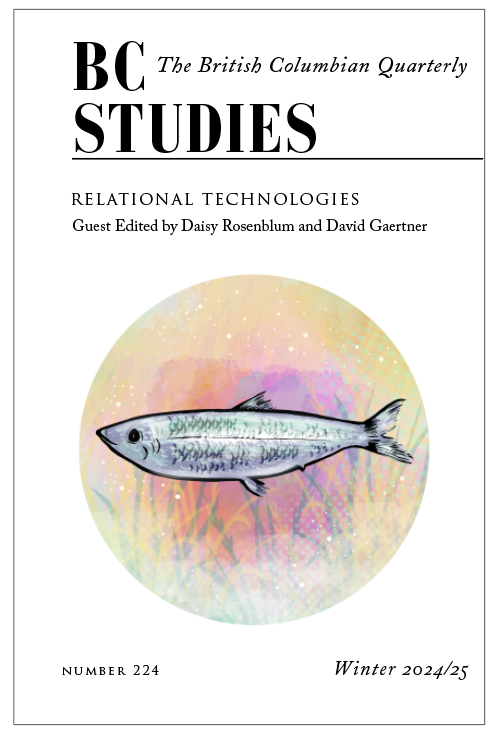






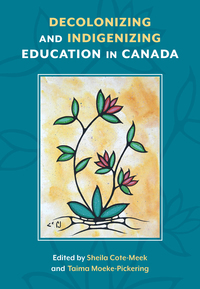
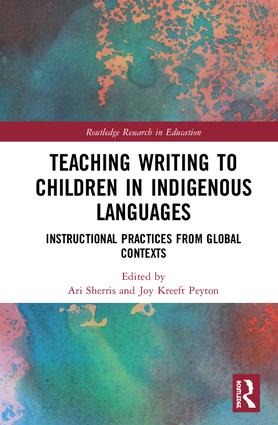
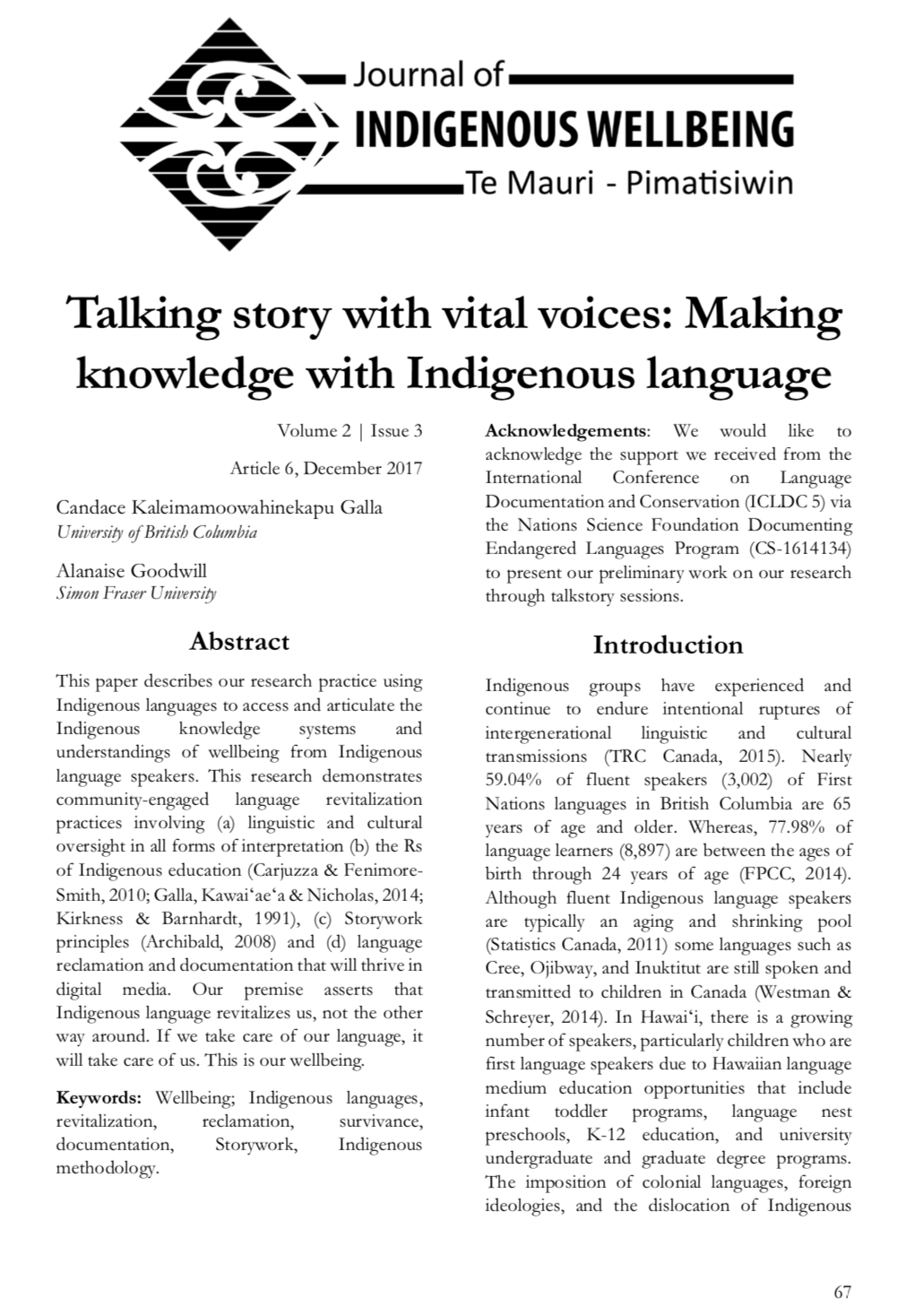
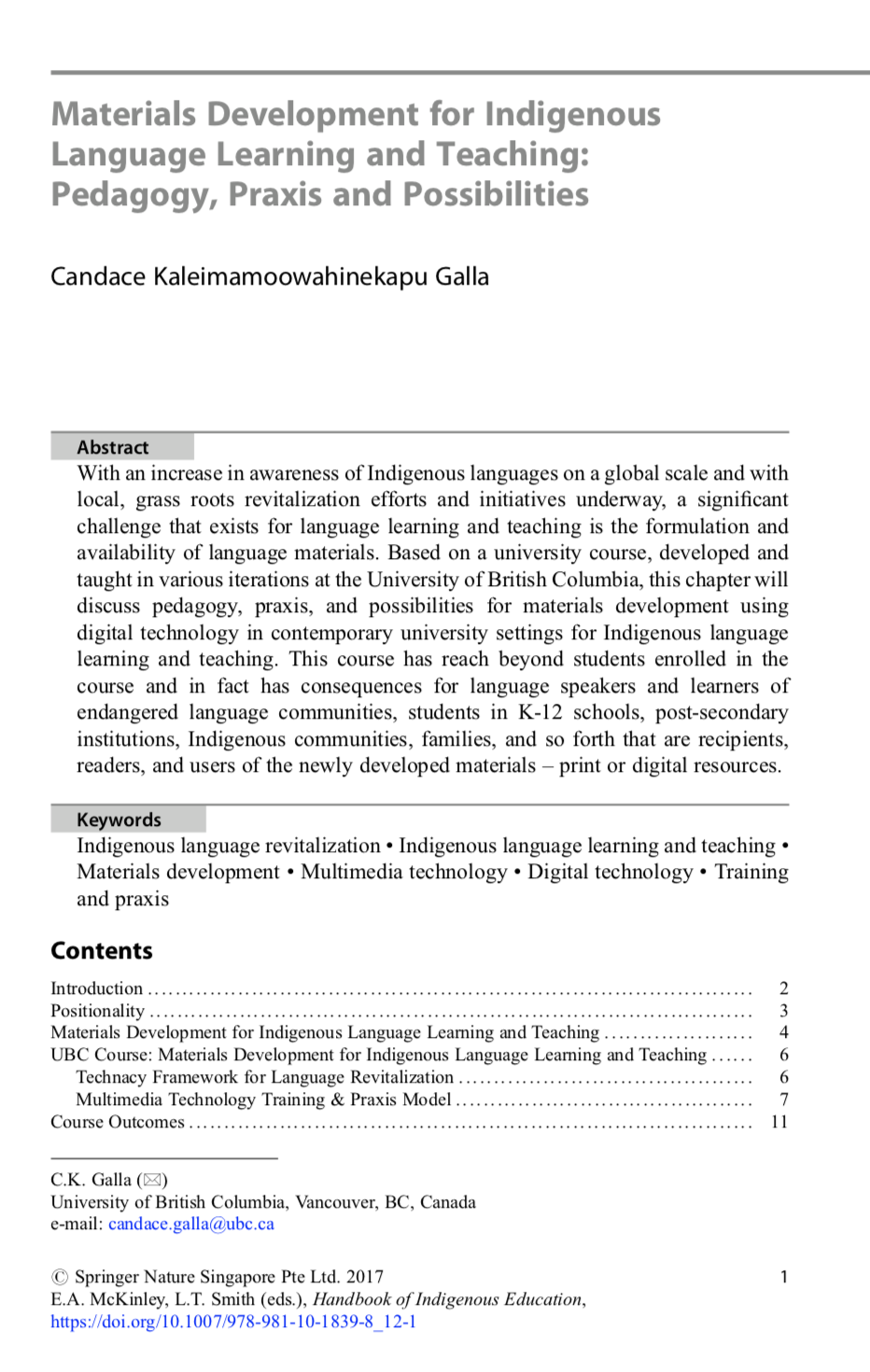

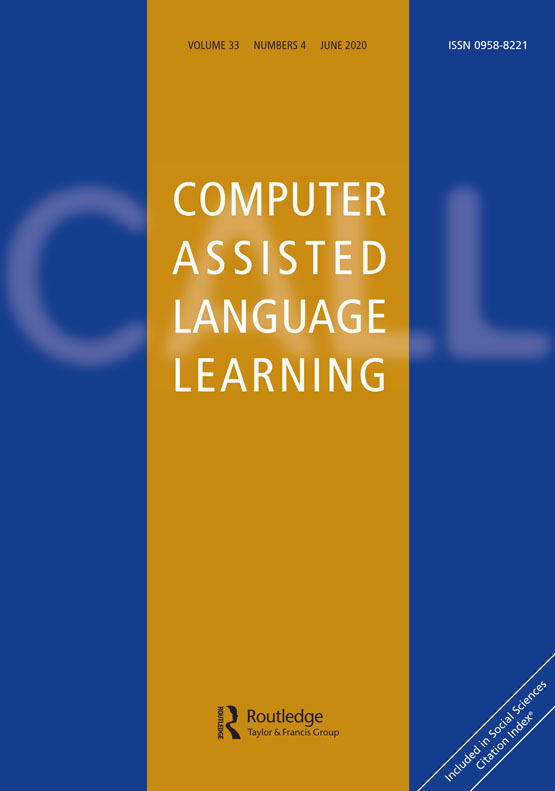
Select Presentations
Select Keynote/Plenary Presentations
- 2024. Language renewal experiences in Hawaiʻi: The role of cultural practices and education in language revitalization (keynote). UNESCO’s International Seminar on Experiences in Linguistic Revitalization. Santiago, Chile.
- 2024. Transforming our thinking about, of, and through Indigenous and embodied language practices (keynote). American Association for Applied Linguistics. Houston, TX, USA
- 2021. Enacting relational accountability to Indigenous languages and their Peoples, communities, and lifeways (online plenary). International Conference on Language Documentation and Conservation. Honolulu, HI, USA. [Video with Opening and Sign Language Interpretation]
- 2019. Shifting Our Perspectives of Hula: Building a Foundation in ʻŌlelo Hawaiʻi (plenary). Language & Literacy Researchers of Canada Pre-Conference, Congress. Vancouver, BC, Canada
- 2019. Indigenous Language Preservation: Global Perspectives (plenary panel). International Association of Language Commissioners. Toronto, ON, Canada
- 2017. Working from a Place of Resilience: Hawaiian Language, Technology and the Contemporary World (plenary). Puliima National Indigenous Languages and Technology Forum. Cairns, QLD, Australia.
- 2017. Living Our Indigenous Languages to Build a Sustainable Future. Keynote. Torres Strait Languages Symposium. Thursday Island, Torres Strait Islands, Australia
Select Invited Presentations:
- 2019. He Pūkoʻa Kani ʻĀina: Creating Pathways for Indigenous Language Vitality. TEDxJIBC. Small Ripples, Big Waves. New Westminster, BC, Canada
- 2019. Role of Technology and Media in Language Revitalization: Help or Hindrance? Panel. United Nations Permanent Forum on Indigenous Issues – Indigenous Media Zone. New York, NY, USA
- 2016. Technology-enhanced Indigenous language Revitalization: Pedagogy, Praxis and Possibilities for Materials Development. Arctic Indigenous Education Conference. Guovdageaidnu, Norway